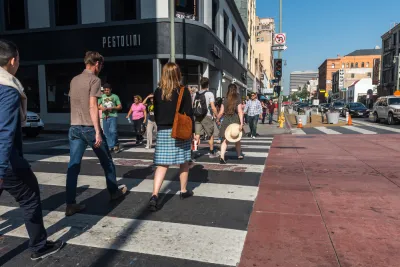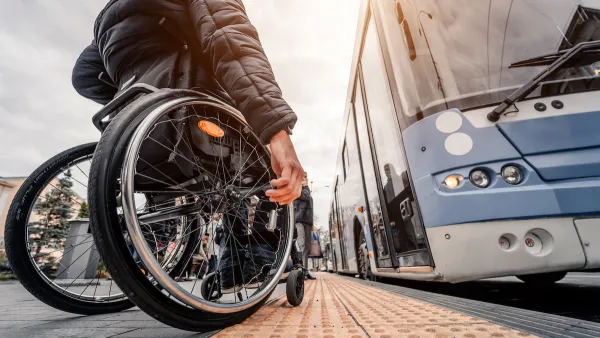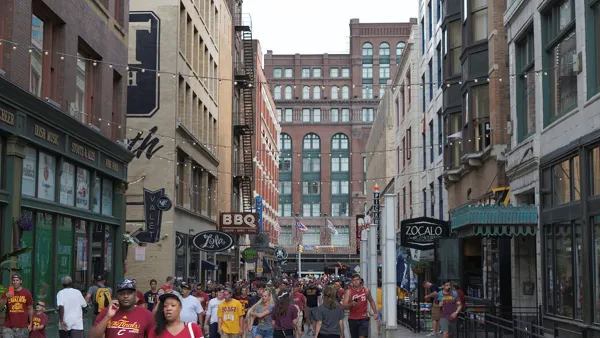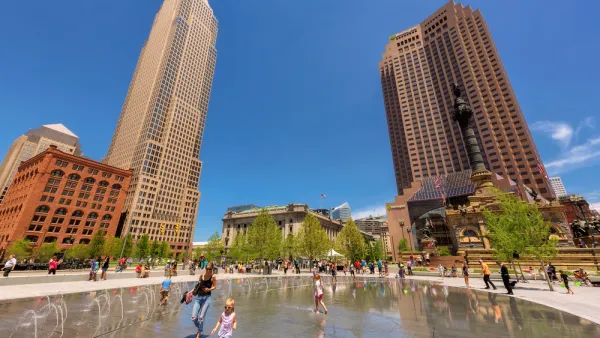Advocates argue that even famously car-centric Los Angeles can become a place where residents can easily access their daily needs without getting behind the wheel.

A coalition of planners, architects, and advocates think Los Angeles—“the ultimate car city”—can become a 15-minute city. That is, with better planning, most residents could reach their daily needs within a 15-minute walking, biking, or public transit trip, reports Erin Stone in LAist.
According to Jenny Hontz of the Livable Communities Initiative, “cars are a culprit when it comes to high rents: cities require developers to build parking spots with housing. In L.A., each spot can cost more than $50,000, upping rent prices.” Consequently, “Higher costs push Angelenos out of the city and into longer commutes, adding to planet-heating emissions. According to 2019 census data, 13% of Angelenos who commuted to the Westside for work drove more than 50 miles to get there.”
The coalition argues that “building smaller housing developments without parking, close to jobs and public transit, coupled with redesigning streets to be more walkable and bikeable, would lower rents and pollution.”
As the article notes, “Implementing the plan doesn't come without obstacles: among other things, it will require rezoning certain areas, dealing with legal challenges and red tape, and dropping the requirement to build parking, in addition to political and industry buy-in.” But with Los Angeles including it in the city’s housing element, it could have legs. Culver City, a small incorporated city on L.A.’s west side, “is on its way to implementing many of the ideas and possibly also working it into their general plan.” Meanwhile, a proposed state bill could eliminate parking requirements for small developments.
FULL STORY: The '15-Minute City': A Strategy To Reduce The Traffic, Pollution And High Housing Costs In LA

National Parks Layoffs Will Cause Communities to Lose Billions
Thousands of essential park workers were laid off this week, just before the busy spring break season.

Retro-silient?: America’s First “Eco-burb,” The Woodlands Turns 50
A master-planned community north of Houston offers lessons on green infrastructure and resilient design, but falls short of its founder’s lofty affordability and walkability goals.

Delivering for America Plan Will Downgrade Mail Service in at Least 49.5 Percent of Zip Codes
Republican and Democrat lawmakers criticize the plan for its disproportionate negative impact on rural communities.

Test News Post 1
This is a summary

Test News Headline 46
Test for the image on the front page.

Balancing Bombs and Butterflies: How the National Guard Protects a Rare Species
The National Guard at Fort Indiantown Gap uses GIS technology and land management strategies to balance military training with conservation efforts, ensuring the survival of the rare eastern regal fritillary butterfly.
Urban Design for Planners 1: Software Tools
This six-course series explores essential urban design concepts using open source software and equips planners with the tools they need to participate fully in the urban design process.
Planning for Universal Design
Learn the tools for implementing Universal Design in planning regulations.
EMC Planning Group, Inc.
Planetizen
Planetizen
Mpact (formerly Rail~Volution)
Great Falls Development Authority, Inc.
HUDs Office of Policy Development and Research
NYU Wagner Graduate School of Public Service





























